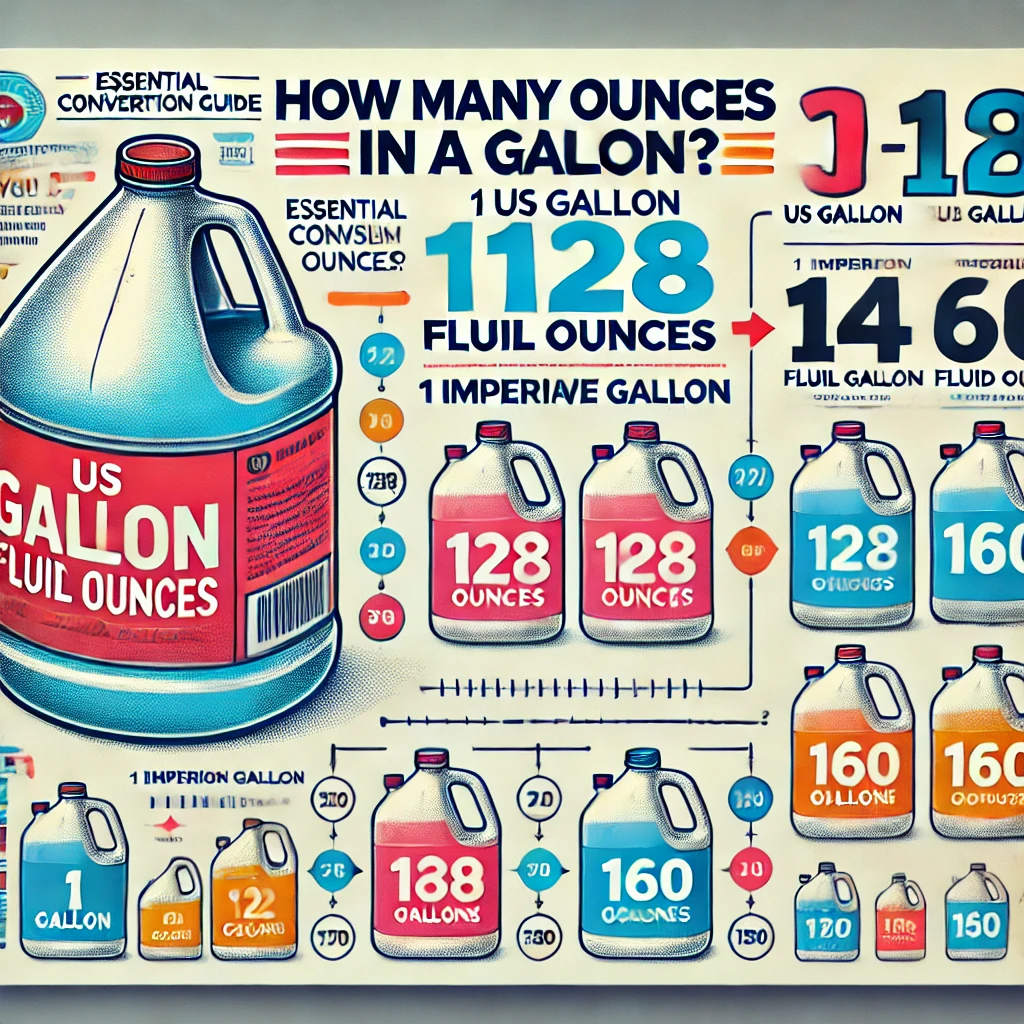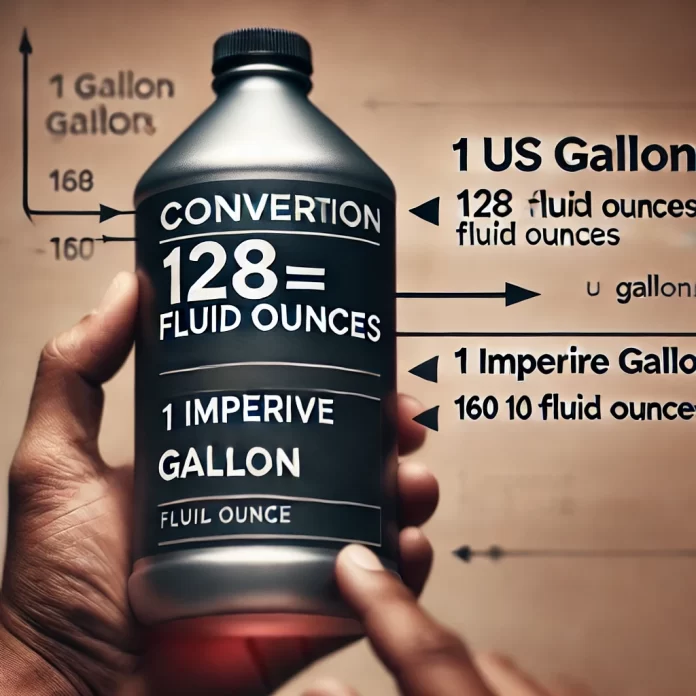For all science for cooking and baking or how scientific measurement is complete, unit conversion is nontrivial and should not be treated as a simple straw. The most common question with liquid measurements is, at the time of this writing, ‘How many ounces are there in a gallon?’ In this blog post, we willvery gram and ounce of this question from US to Imperial measurement systems to learn how you can quickly convert your fluid ounces. So, in this article, I will show you every piece of this process and spend the least amount of time possible avoiding duplicating work.
1. What Is a Fluid Ounce?
A unit for quantifying the volume of a liquid is defined as a fluid ounce. The fluid ounce in the US customary system is the US fluid ounce and the Imperial fluid ounce in the UK. The US fluid ounce is about 29.5735 milliliters; of course, the Imperial fluid ounce is a little more: 28,4131 milliliters. The ‘dry ounce,’ distinct from the ‘fluid ounce,’ does not refer to weight because the fluid ounce does. You’ll never convert gallons, but if you’d like to do units of gallons, you need to know this because a gallon isn’t the same whether it’s in a liquid gallon or a dry gallon; you don’t have the same number of fluid ounces in gallon.
2. Understanding Gallons and Their Types
A liquid gallon is a volumetric unit of large volume. There are two main types of gallons: US and Imperial gallons. While they share the same name, their volume differs significantly:
- US Gallon: Each size is 128 fl oz or 3.785 L.
- Imperial Gallon: Those add up to 160 fluid ounces or 4.546 liters.
These variations can lead to clarity while measuring. That’s probably the conversion bit, right, but what gallon? You can get imperial and US gallon types. Between that, you can be 20 percent out.
3. How Many Fluid Ounces Are in a Gallon?
A gallon is another way of putting it; there’s a gallon in a US unit where 1 gallon equals 128 fluid ounces. A gallon was 160 fluid ounces until at least the Imperial system, and even there, it is still a gallon. If you are converting, your language does not calculate you as a number, and you need a string for your new result, then you aren’t stuck.
- US Gallon: While 1 US gallon may be written, sometimes, as fl. oz., sometimes as fl oz, or sometimes simply as fl oz. In these two cases, 128 US fluid ounces, or fl oz.
- Imperial Gallon: 160 Imperial fluid ounces is an Imperial gallon.
If you are cooking, ing, o, or doing a do-it-yourself project, knowing how many ounces in gallon is fantastic.
4. US Gallon vs. Imperial Gallon: What’s the Difference?
You would get a different reading between the US and Imperial gallon one out of three times. The key differences are:
- Volume: 161 fluid ounce is equal to us gallon. However, we are not equal to the US gallons, which equals 128 fluids ounce.
- Usage: The two most common are the US (United States and some other countries) gallon and the imperial (UK and Canada) gallon.
If that line has been drawn from US customary or imperial units, then the historical definitions of units have been because of this.
5. How to Convert Fluid Ounces to Gallons and Vice Versa?
Dividing that information in the other direction, a gallon by 16 tells you you instantly know how many fluid ounces a gallon contains. If you want to convert into gallons from ounces, all you have to do is divide by the number you want to convert into by 128 for the US gallons and 160 for the imperial gallons! Here’s a quick formula:
- US Conversion: Fluid ounces ÷ 128 = Gallons
- Imperial Conversion: Fluid ounces ÷ 160 = Gallons
For example, we have 256 US fluid ounces to divide by 128, and you’d come up with 2 US gallons.
6. Dry Gallon vs. Wet Gallon: Key Differences Explained
A dry gallon is a gallon of dry goods; a liquid gallon is a gallon, though it’s not a gallon that way. It’s for these reasons (we mention it) that the US system has ‘wet gallon’ – legally, 128 fluid ounces – and ‘dry or grain’ gallon – 4.4 (liter), or about 148.94 (cubic) cubic inches. Yes, it’s used in a business (any dry gallon, not usually, is used). In other settings, one thing to know is this distinction: A dry gallon versus a wet gallon.
7. Fluid Ounces in a Gallon of Water
Or change the example to, say, you want to know how many gallons of fluid ounces areare in one. The Imperial gallon has 160 fluid ounces, and the US gallon – has 128 fluid ounces. Aside from voiding results, the same relies on chance of chance in case of a lab objective to measure water or, like the recipe for any international dish, it plays the role, too.
8. Why Understanding the Measurement System Matters?
Measurement systems vary globally; what you don’t know can lead to incorrect conversions and interpretations. The US customary system and the Imperial system are unlike one another in their measurement units. This will firstly be able to convert accurately from one unit to another, depending on whether you use it for your personal use or/or professional applications.
9. Quick Conversion Chart: Ounces to Gallons
Here’s a handy conversion chart to help you quickly convert ounces to gallons and vice versa:
| Fluid Ounces | US Gallons | Imperial Gallons |
| 1 | 0.0078 | 0.0063 |
| 16 | 0.125 | 0.1 |
| 32 | 0.25 | 0.2 |
| 64 | 0.5 | 0.4 |
| 128 | 1 | 0.8 |
| 160 | 1.25 | 1 |
This chart provides a quick reference for converting between fluid ounces and both US and Imperial gallons, ensuring you always get the right measurement.
10. Common Questions About Gallon and Ounce Conversions
How Many Ounces Are in a Gallon of Ice Cream?
How dense your ice cream is determines how many ounces a gallon has. One CT is one US gallon of ice cream and is still 128 ounces of fluid.
Why Are There Different Types of Gallons?
Gallons have changed over the years due to historical variations in what measures them and are expressed in three ways: US, Imperial, and dry. The Imperial was set up in 1824 for standardizing measurements in the UK, while the US gallon was used on top of the wine gallon used in England.
Is One Type of Ounce Used for Both Liquid and Dry Measurements?
They don’t measure liquid by fluid ounces; they measure weight on the dry ounces. Make this distinction when converting measurements because you will be way off the mark if you use the wrong ounce.
How to find Best Smart Home Devices of 2024

Summary of Key Points
- Fluid Ounce and Gallon Types: Knowing the difference between US and Imperial gallons is among the knowledge you should have.
- Conversion Basics: 1 US gallon = 128 US fluid ounces1 Imperial gallon = 160 Imperial fluid ounces
- Dry Gallon vs. Wet Gallon: The dry gallon measure weight, and the wet gallon measure liquid volume because one measures weight and the other measures liquid volume.
- Quick Reference Conversion Chart: Doing fluid ounce-to-gallon conversions will be easy with the chart.
- Different Measurement Systems: Conversion between units internationally, including the US Customs and Imperial systems.
But with this basic knowledge of how to convert fluid ounces and gallons, you can now convert from and to fluid ounces and gallons confidently anywhere (even in the kitchen and laboratory).
The Role of Macronutrients in Weight Loss
Gallon Measurement Guide
Unit of usage of liquids, one gallon is a considerable fluid volume unit measure, known as US liquid gallon or imperial gallon. In the US, a gallon is 128 fluid ounces, which is 8 ounces to the gallons. Except in the case of the US system of oz in a Liters, there are 128 ounces and many oz in a gallon. Here, we don’t get confused about how many ounces are in a gallon. But you’ll use different amounts of ounces depending on what type of Liters you’re using. US gallons of liquids aren’t 160 fluid ounces; I assure you, I’ve worked through this one. But again, that portion of it only becomes more complicated when you’re using vs dry ounces and fluid ounces for dry measurements, as is the case in that one.
Unfortunately, ounces in any given system don’t equal ounces in another, and there’s one imperial gallon to one US gallon. For example, a US liquid gallon would be 128 fluid ounces or 3.785 , which is true enough, but never about the Imperial gallon being more than fluid ounces or 3.785 liters 1 Imperial gallon can contain approximately 129 to 163 ounces and gallon is a unit contains 128 fluid ounces in gallon , 128 ounces in gallon also gallon can vary depending it often contain fluid ounces in an imperial but you need to consider that a gallon is equal to 160 fluid ounces , you divide the fluid ounces by 160 also remember Imperial gallon is equal to a larger volume than the US gallon and ounces are used for liquids
Ounce Differences
When converting ounces to gallons, you need to know if they are Imperial or US gallons, as they aren’t the same value. (1 imperial gallons and ounces is a 4 quarts in a gallon , but that’s a change of system, 1.) In the Imperial gallon, it is 160 fluid ounces; in the, it is it is 128 fluid ounces. If you live what an ounce in an imperial gallon is in fl. oz, you divide by 160. When you convert 1 US liquid gallon to fluid ounces, convert gallons to ounces in a US system, you multiply by 128, so that’s how you are opposites; this is imperial, half gallon is equal or smaller than the US system, so it doesn’t have one at the same fraction (57 US fl oz).
If you know the conversion factors, then it will be easy; if you don’t know how to measure ounces, then it will be tough. Then we have one last thing, which will turn out to be somewhere where the Imperial fluid ounce is equated to the amount of fluid ounce equal to one of the Imperial fluid ounces. Still, you get assigned to remember this number of Imperial fluid ounces because we got gallons or 153.6 fluid ounces fluid ounces here instead. That’s why if you have ounces of liquid – Imperial gallons or fluid ounces- you know what you’re doing. Because when converting ounces to dry ounces out of all the possible errors that could happen ounces are used for measuring how many ounces. us gallon is equal to 128 ounces in one gallon or gallon is equal to 128 ounces


